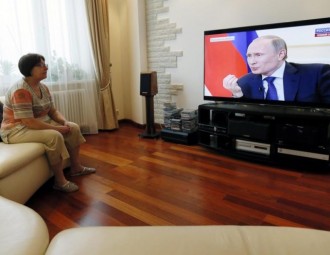How did Belarus’ political course change under the influence of Russian aggression and propaganda?

Several hundred experts and scholars gathered in Kaunas at the 6th International Congress of Belarusian Studies.
The annual forum brought together experts of Humanities and Social Sciences from Belarus, Poland, Ukraine, Lithuania, Moldova, the United Kingdom and other countries. The organizers of the event have prepared a dozen of specialized sections and panels: from the problems of historical research to the issues of modern Bible translations, from gender to the development of national security.
Study and discussion of Russian influence in Eastern Europe and the consequences of information war that broke out in the region were high on the agenda at the Congress. Despite the common Eurasian political and economic space with Russia, experts note a significant cooling in Minsk-Kremlin relations. Belarus refused to build a military base for Moscow, the government announced the revision of tariffs for the transit of Russian oil products, and Belarusian officials renewed contacts with Western diplomats. International relations, national security and the issue of "disintegration in the region" were given special attention at the Congress.
"Among the huge number of topics the biggest attention is, of course, given to the political course of Belarus under the influence of Russian aggression and propaganda," - said Andrei Kazakevich, the director of the Institute for Policy Studies Palіtychnaya Sphera (Political Sphere) and the Chair of the Congress Organizing Committee. "We are all aware that after the events in Ukraine in 2014, we entered the new geopolitical conditions. The old rules do no longer apply; and Russia is pursuing unpredictable policy. There is great uncertainty as to how this situation will look like in the near future. These rules are just starting to line up again."
The analyst pointed out that the current situation could only be studied in complex. First of all, the Belarusian society should study the experience of hybrid war that has been used in Ukraine to prevent it from happening again. Also, according to Kazakevich, economic impact on the situation through funding political movements and "subversive forces" is also worth to be analyzed. Economic component seems to be particularly important in the situation of an economic crisis.
Ryhor Astapenia, a researcher at the Ostrogorski Centre is convinced that the level of Belarus’ dependence on the Russian Federation is decreasing: "We must admit that now the formation of the Belarusian statehood is continuing. Now we are seeing a general trend - the number of Belarusians who study in military departments in Russia is decreasing. Over the past 7 years, the participation of Belarusian troops in joint exercises has decreased by 50 percent. Independent Belarusian embassies and representative offices open everywhere, whereas previously they only existed as an appendage to the Russian diplomatic mission, taking small spaces in Russian Embassies."
At the same time, Astapenia noted that the influence and activity of pro-Russian media that broadcast for Belarus and get funded in Russia has increased in our country. Russian media tend to have a critical attitude to the recent political steps and statements of the official Minsk. Astapenia believes that the information "baiting" is solely due to the attempts of the official Minsk to distance itself from the official policy of the Russian Federation.
Despite the small attempts and steps of the Belarusian side to pursue an independent policy, both analysts believe that loyal partner relations between Belarus and Russia will not change. The reasons for that lie primarily in the economic and political ties and the actual dependence of Belarus on Russian economic and political support.
-
03.01
-
07.10
-
22.09
-
17.08
-
12.08
-
30.09



























